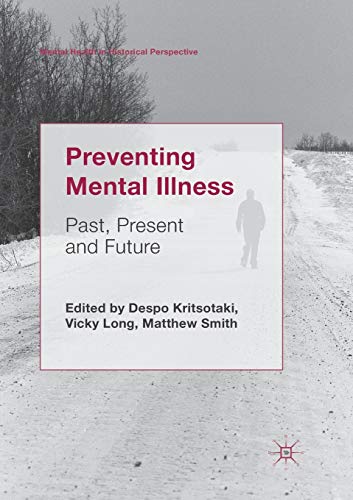Childhood Investment: The Key To Preventing Future Mental Health Problems

Table of Contents
The Importance of Early Childhood Development
The foundation for lifelong mental health is laid during the critical early years of childhood. This period shapes a child's emotional development, resilience, and ability to cope with stress. Two key aspects stand out: secure attachment and the power of play.
Secure Attachment and its Long-Term Effects
Secure attachment, formed through consistent and responsive caregiving in infancy, is paramount. It equips children with the ability to regulate their emotions, build healthy relationships, and develop a sense of self-worth.
- Responsive parenting, characterized by consistent attention to a child's needs and emotional cues, fosters secure attachment.
- Conversely, inconsistent or neglectful parenting can lead to insecure attachment styles, increasing the risk of anxiety, depression, and relationship difficulties later in life.
- Secure attachment is directly linked to reduced risk of anxiety disorders and depression in adulthood, demonstrating the long-term benefits of early childhood investment in this area.
The Role of Play in Cognitive and Emotional Development
Unstructured play is not mere recreation; it’s a vital component of cognitive and emotional development. Through play, children develop crucial social, emotional, and cognitive skills.
- Different types of play offer unique benefits: imaginative play fosters creativity and problem-solving, while social interaction hones communication and empathy.
- Imaginative play allows children to process emotions and experiences in a safe environment, strengthening emotional intelligence.
- Play significantly improves a child's ability to regulate their emotions, develop empathy, and build resilience – all crucial buffers against future mental health challenges.
Nurturing Mental Well-being Through Education and Support
Investing in a child’s mental well-being extends beyond the family unit, requiring societal support and access to vital resources.
Access to Quality Education and Resources
Access to quality early childhood education programs, including preschool and early intervention services, is crucial. These programs provide a stimulating environment that fosters cognitive development and social-emotional learning.
- Early intervention programs effectively identify and address potential developmental delays, preventing more significant problems later on.
- Supportive teachers and educators create a positive learning environment that nurtures a child's self-esteem and confidence.
- Inclusive education benefits all children, promoting understanding and acceptance of diverse needs and abilities.
Parental Mental Health and its Influence on Children
A parent's mental health significantly impacts a child's well-being. Parental stress and mental illness can negatively influence a child's development and increase their vulnerability to mental health problems.
- Parental self-care is crucial; parents who prioritize their own mental health are better equipped to support their children.
- Access to mental health resources for parents is essential, providing them with the tools and support they need to cope with stress and challenges.
- Numerous organizations offer support for parents struggling with mental health challenges, providing guidance and resources for navigating difficult times.
Building Resilience and Coping Mechanisms
Equipping children with the skills to navigate life's challenges is a fundamental aspect of childhood investment.
Teaching Emotional Regulation Skills
Teaching children emotional regulation skills from an early age is vital. This empowers them to manage stress, anxiety, and other difficult emotions effectively.
- Practical techniques like deep breathing exercises and mindfulness practices can be taught and practiced regularly.
- Open communication and encouraging children to express their feelings are essential for healthy emotional development.
- Teaching problem-solving skills helps children develop strategies for dealing with challenging situations.
Fostering a Supportive and Understanding Environment
Creating a supportive and understanding environment at home and school is paramount. Children need a safe space where they feel comfortable expressing themselves and seeking help when needed.
- Positive reinforcement and unconditional love foster a child's self-esteem and resilience.
- Open communication and active listening allow children to feel heard and understood.
- Creating a safe space free from judgment enables children to share their feelings openly without fear of criticism.
Conclusion
Investing in childhood is not merely beneficial; it’s essential for a healthier and more resilient future generation. By prioritizing secure attachment, promoting play, ensuring access to quality education and support, and fostering emotional regulation skills, we can significantly reduce the risk of mental health problems later in life. This childhood investment translates into a stronger, more empathetic, and mentally healthier society. Let's advocate for policies and programs that support early childhood development and mental health. We must recognize that early intervention and nurturing are critical components of preventative mental healthcare. Visit [link to relevant resource 1] and [link to relevant resource 2] for more information and support.

Featured Posts
-
 Ahead Computing Secures 21 5 M In Seed Funding
May 02, 2025
Ahead Computing Secures 21 5 M In Seed Funding
May 02, 2025 -
 Endonezya Ve Tuerkiye Imzalanan Anlasmalarin Oenemi
May 02, 2025
Endonezya Ve Tuerkiye Imzalanan Anlasmalarin Oenemi
May 02, 2025 -
 Preparing Your Pitch For Dragons Den A Comprehensive Checklist
May 02, 2025
Preparing Your Pitch For Dragons Den A Comprehensive Checklist
May 02, 2025 -
 Rupert Lowe Great Yarmouth At The Forefront Following Political Rift
May 02, 2025
Rupert Lowe Great Yarmouth At The Forefront Following Political Rift
May 02, 2025 -
 100 Year Old Dalla Actress Priscilla Pointer Passes Away
May 02, 2025
100 Year Old Dalla Actress Priscilla Pointer Passes Away
May 02, 2025
